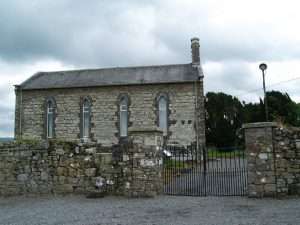Sermon for Sunday, 26th February 2017 (The Transfiguration)
“And he was transfigured before them.” Matthew 17:2
Four experiences of Peter, James and John can help us think about our own lives as Christians. Saint Matthew’s account of the transfiguration of Jesus tells us that Jesus “led them up a high mountain”; that “a bright cloud overshadowed them”; that they were “overcome by fear;” and that they were “coming down the mountain.” Each of the experiences captures particular feelings and moods and helps us think about the Christian life.
Saint Matthew Chapter 17 Verse 2 tells us, “Jesus took with him Peter and James and his brother John and led them up a high mountain, by themselves”. What passed through their minds as they walked up the steep pathways? Perhaps they asked themselves why they had been asked to go with Jesus, while the others remained behind. Perhaps they wondered to themselves why they had to make such a difficult climb, for Saint Matthew says it was a “high mountain.” Perhaps they wondered why Jesus wanted to go to such a remote place when he usually spent much time surrounded by crowds of people. Perhaps they found their feet slipping at times, perhaps they grazed their legs on the sharp rocks, perhaps they found it difficult to find hand holds, perhaps they even muttered between themselves about why Jesus would want to bring them to such a place.
Perhaps the thoughts of Peter, James and John climbing the high mountain have parallels in our own lives. Being a Christian is not always easy, it is not a straightforward path. There are times when we might wonder why we have to go through particular experiences when other people have it easier. There are times when we might wonder why God expects us to go through rough times. There are times when we might ask questions of God, ask him why he has brought us to a particular place in our lives.
“A bright cloud overshadowed them,” says Verse 5. Jesus has been transfigured, his face has shone like the sun, and his clothes have been dazzling white. Moses and Elijah have appeared and Peter has wanted to build shelters for them. It has been an extraordinary moment, and the bright cloud comes as a confirmation of all that has happened. God’s presence confirms what they have seen and heard, God’s voice tells them to listen to Jesus. They would have known their Scriptures; they would have known God had appeared to Moses and Elijah; they would have known what an extraordinary privilege this moment was.There would have been a sense of inexpressible wonder, joy, triumph,but perhaps also a sense that this moment was unbelievable.
Sometimes, there are moments in life when it seems as though we are overshadowed by a bright cloud, when we feel greatly blessed by God. Perhaps we are slow to recognize such times, perhaps it is only afterwards that we have a sense of the significance of what has happened. Perhaps we only become aware that God has been present with us when we look back at the moment. Perhaps, also, we have questions, perhaps moments can seem too good to be true. Perhaps moments can seem almost unbelievable.
The disciples hear the voice of God and they become aware of the full reality of what is happening. Verse 6 says, “When the disciples heard this, they fell to the ground and were overcome by fear.” As the moments passed, as they thought about Moses and Elijah they would have remembered the stories from Scripture, they would have remembered God being a terrifying God; they would have remembered how no-one could see God’s face and live; they would have remembered the tales of the power of God’s presence. As the moments passed, the excitement would have been replaced by apprehension, and the apprehension by fear, and the fear by terror, and they are so frightened that they fall to the ground. They lose all the confidence they had, until Jesus reassures them, “Get up and do not be afraid,” he tells them in Verse 7.
Have we been though such moments in our own Christian lives, we are happily confident, we are certain about our decisions, then questioning and doubts arise. Like the disciples, we begin to think about things, and the more we think, the more our confidence ebbs away. Instead of being inspired, we become timid and frightened, instead of being able to face things, we just want to hide. We need the words of reassurance that Jesus gives to Peter, James and John, “get up and do not be afraid.”
They were “led them up a high mountain”; “a bright cloud overshadowed them”; and they were “overcome by fear;” the fourth experience is described in Verse 9, “As they were coming down the mountain, Jesus ordered them, ‘Tell no one about the vision until after the Son of Man has been raised from the dead.'” Peter, James and John have had this extraordinary moment, a moment that we still recall, and they are told to say nothing about it. Jesus’ instruction to them must have made that walk back down the mountain all the more difficult. Treading the stony path downwards, there must have been a mood of despondency as the headed back to the reality of the lives they lived.
The sense of “coming down the mountain” is probably a frequent experience for us. There will probably have been moments when we have felt encouraged, felt uplifted, maybe even felt that there is nothing that we cannot do, then we have faced up to our everyday life and we feel discouraged and deflated. Jesus doesn’t tell Peter, James and John to forget about what has happened, instead he tells them to tell no-one until he has risen from the dead; the moment will be a continuing encouragement for them. The moments when we feel encouraged and uplifted are moments we should remember, they are moments which we should retain, so when we are feeling downcast and depressed, we can know that defeat is never the last word.
The experiences of the disciples on the mountain can inspire us in our own experience as Christians, the hard moments, the inspiring moments, the fearful moments and the depressing moments.



Comments
Sermon for Sunday, 26th February 2017 (The Transfiguration) — No Comments
HTML tags allowed in your comment: <a href="" title=""> <abbr title=""> <acronym title=""> <b> <blockquote cite=""> <cite> <code> <del datetime=""> <em> <i> <q cite=""> <s> <strike> <strong>